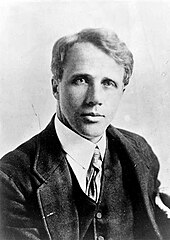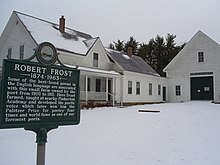Robert Frost
Robert Lee Frost (born March 26, 1874 in San Francisco , California , † January 29, 1963 in Boston ) was an American poet and four-time Pulitzer Prize winner .
Life
Robert Lee Frost is almost always associated with New England , but was born in San Francisco and lived there until he was twelve. His mother Isabelle Moodie Frost was of Scottish descent, his father William Prescott Frost Junior was the descendant of English immigrants who landed with the Wolfrana in what is now New Hampshire in 1634 .
After his father died of tuberculosis on May 5, 1885 , Frost and his family moved to Lawrence , Massachusetts , to live with his grandfather, William Prescott Frost Sr. , who was a factory overseer there. Here, at the insistence of his mother, Frost was baptized in the New Church , of which she herself belonged. Frost left this church as an adult.
Frost is best known for his poetry about rural New England, but published his first poems during his life in the city (at the time Lawrence was one of the largest cities in Massachusetts). After high school he graduated from Dartmouth College (a College of the Ivy League ; actually he aspired to study in Harvard , where he was indeed adopted, but for financial reasons could not study), where he joined the fraternity joined Theta Delta Chi. Then he worked, back in Lawrence, among other things as a teacher and on the side as a newspaper deliverer and factory worker.
In 1894 he sold his first poem "My Butterfly: An Elegy," which was published on November 8, 1894 by the New York Independent .
After a trip to the Great Dismal Swamp National Wildlife Refuge on the Virginia and North Carolina borders , he proposed marriage to Elinor Miriam White , which she accepted (an earlier proposal she had turned down because she wanted to wait to graduate from St. . Lawrence University ). Frost and White were later married in the chapel of Harvard University, where he studied for two years after his trip.
Although he was a good student, he left university to better finance his growing family. His grandfather bought him a farm in Derry, New Hampshire shortly before his death. Frost worked here as a farmer for nine years. He wrote many of his later popular poems before starting his daily work at 6:00 a.m. Since he had no long-term success with farm work, he began working again as an English teacher, this time at Pinkerton Academy (now Plymouth State University , New Hampshire).
In 1912, Frost and his family left the United States to immigrate to the United Kingdom . At first he lived in Glasgow , later he settled in Beaconsfield , a suburb of London . His first collection of poems, A Boy's Will , was published the following year.
During his life in London, Frost met many important European poets and writers, including Thomas Ernest Hulme , Edward Thomas and Ezra Pound (who himself emigrated to Great Britain as an American writer). It was the latter who later wrote one of the most widely acclaimed reviews of Frost's work. In England, Frost wrote many of his later famous poems.
After the outbreak of World War I , he returned to the United States in 1915, where he bought a farm in Franconia , New Hampshire. Here he took up his activity as a teacher again; he became a professor of English at Amherst College . In 1922 he wrote one of his most famous poems: Stopping by Woods on a Snowy Evening ( behaving on a snowy evening in the forest ). He was elected to the American Academy of Arts and Letters in 1916, the American Academy of Arts and Sciences in 1931, and the American Philosophical Society in 1937 .
Until his death on January 29, 1963, Frost worked at Amherst College, where his chairs and academic functions changed. During much of this time he taught courses at the Bread Loaf School of English ( Ripton , Vermont ) at Middlebury College , where mainly American high school teachers continue their qualifications.
From 1940 onwards, Frost spent the winters in his house near Coconut Grove / Miami .
Robert Frost died in Boston, Massachusetts, aged 88 . He was buried in the family grave at Old Bennington Cemetery in Bennington , Vermont . Before his death, the later Oscar- winning documentary Robert Frost: A Lover's Quarrel with the World was completed.
meaning
In his lyrical work, Frost repeatedly addresses his homeland. Many of his poems are nature poems describing the New England countryside. Frost developed his own theory of poetry, in which the metaphor as the basis and the mixture of strict meters with natural speech rhythms of the English language play central roles. Frost received the Pulitzer Prize for four of his volumes of poetry. He is one of the most important poets of the 20th century. There are parallels to Emily Dickinson .
Honorary doctorates
- Bates College
- Oxford University
- Cambridge University
- Dartmouth College (double honor)
- Harvard University
Works
Volumes of poetry
- A boy's will . 1913
- North of Boston . 1914
- Mountain Interval . 1916
- New Hampshire . 1923
- West-running Brook . 1928
- A further range . 1936
- A witness tree . 1942
- Steeple Bush 1947
- In the clearing . 1962
- Desert Place .
Dramatic texts
- A masque of reason . 1945
- A masque of mercy . 1947
records
- The Notebooks of Robert Frost . 2007 ISBN 978-0-674-02311-6 , 2009 ISBN 978-0-674-03466-2
Work editions
- Collected Poems, Prose and Plays. Edited by Richard Poirier. Library of America , 1995, ISBN 978-1-883011-06-2 .
- Complete poems. Holt, Rinehart & Winston, New York 1967.
German editions
- Collected poems. Transferred from Alexander von Bernus , Hermann Claudius , Eva Hesse , Wilhelm Lehmann , Hans Leip , Kurt Erich Meurer , Dagmar Nick , Robert R. Schnorr, Hermann Stock, Georg von der Vring . Kessler, Mannheim 1952
- Poems. Edited by Eva Hesse. Transfers Paul Celan , Hesse u. a. Langewiesche-Brandt, Ebenhausen 1963 a. ö.
- Promises to Keep. Poems, poems . Lars Vollert (ed., Transl.), Langewiesche-Brandt, Ebenhausen 2002
Quotes
- "Happiness makes up for what it lacks in length in height."
- "Poetry is what gets lost in translation."
- "In three words I can sum up everything I've learned about life: 'It goes on.'"
- "Education is the ability to listen to almost anything without losing calm or self-confidence."
- The poem Fire and Ice (1920):
| Some say the world will end in fire, | Some say the world is burning up |
| Some say in ice. | some say in ice. |
| From what I've tasted of desire | After what I tasted of lust |
| I hold with those who favor fire. | I do it with those who prefer fire. |
| But if it had to perish twice, | But she must go under twice |
| I think I know enough of hate | I know hate well enough |
| To say that for destruction of ice | knowing that for the destruction of ice |
| Is also great | is also great |
| And would suffice. | and sure enough. |
Perception in popular culture
In the 1977 film Telephone, directed by Don Siegel , Soviet sleepers are activated by a verse from Frost's poem Stopping by Woods on a Snowy Evening , who then commit acts of sabotage.
In the third part of the Twilight series Eclipse - Biss zum Abendrot by author Stephenie Meyer , the poem "Fire and Ice" is quoted at the beginning of both the book and the film of the same name.
Web links
- Literature by and about Robert Frost in the catalog of the German National Library
- Works by and about Robert Frost in the German Digital Library
- Robert Frost Poems - Extensive collection of poems on Famous Poets and Poems (English)
- Johannes Urzidil speaks on the death of Robert Frost. Inclusion in the online archive of the Austrian Media Library
Individual evidence
- ↑ Original text from Stopping by woods on a snowy evening and German translation
- ↑ Members: Robert Frost. American Academy of Arts and Letters, accessed March 1, 2019 .
- ↑ The grave of Robert Frost. knerger.de
- ^ Ruprecht Skasa-Weiß: House and soul, newly renovated. (No longer available online.) In: Stuttgarter Zeitung. July 21, 2005, archived from the original on August 4, 2011 ; Retrieved July 22, 2009 .
- ↑ Robert Frost: Robert Frost Quotes. In: Brainyquote. Retrieved December 1, 2009 .
- ↑ brainyquote.com
- ↑ Robert Frost: Quotes and Sayings. zitate.net
- ^ Telephone, 1977 . imdb.com; accessed on January 30, 2013.
| personal data | |
|---|---|
| SURNAME | Frost, Robert |
| ALTERNATIVE NAMES | Frost, Robert Lee |
| BRIEF DESCRIPTION | American poet |
| DATE OF BIRTH | March 26, 1874 |
| PLACE OF BIRTH | San Francisco , California |
| DATE OF DEATH | January 29, 1963 |
| Place of death | Boston |



